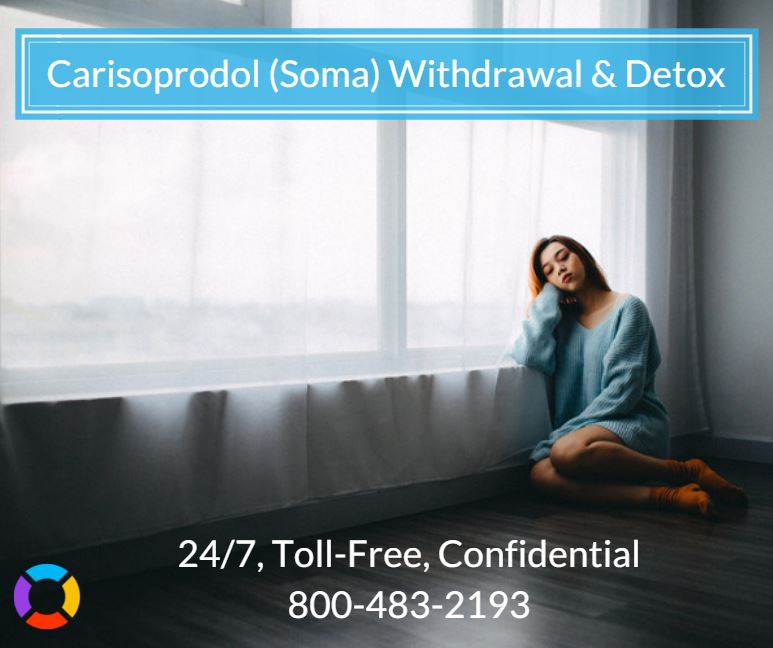Carisoprodol Detox
 Carisoprodol is a muscle relaxant that is meant to ease the discomfort caused by muscle injuries. The drug is marketed under the brand name Soma and prescribed by a doctor. While it can be effective for those who require treatment for a sprain or strain, many people also misuse carisoprodol because it can cause relaxing and euphoric effects when taken in large doses. This type of use can lead to addiction as well as dependence, but even those who take the medication as prescribed can experience dependence if they take it regularly for a few weeks or longer. Dependence can lead to intense withdrawal symptoms, which, in turn, will require treatment in a carisoprodol detox center.
Carisoprodol is a muscle relaxant that is meant to ease the discomfort caused by muscle injuries. The drug is marketed under the brand name Soma and prescribed by a doctor. While it can be effective for those who require treatment for a sprain or strain, many people also misuse carisoprodol because it can cause relaxing and euphoric effects when taken in large doses. This type of use can lead to addiction as well as dependence, but even those who take the medication as prescribed can experience dependence if they take it regularly for a few weeks or longer. Dependence can lead to intense withdrawal symptoms, which, in turn, will require treatment in a carisoprodol detox center.
Understanding Carisoprodol Abuse

Carisoprodol abuse can lead to tolerance and addiction.
Carisoprodol is meant to be used in conjunction with rest, ice, and other treatments in order to relieve pain caused by a muscle sprain, strain, or other type of muscle injury. According to the National Library of Medicine, it is usually marketed as the brand name drug Soma, which also includes aspirin.
Carisoprodol can be a helpful medication for those who need extra support when nursing a hurt muscle.
- Carisoprodol is often used safely and effectively to treat muscle sprains.
- However, one of the drug’s major metabolites is meprobamate, which is a CNS depressant. Meprobamate acts like other drugs of this class in that it causes relaxation and when used in large doses, euphoria.
- Carisoprodol is often abused for this reason by those who want to achieve a quick high.
Carisoprodol abuse is dangerous, just like any type of substance abuse. Those who are originally taking the drug as prescribed by a doctor and who then begin to take more because they like the way it makes them feel are also in serious danger of problematic effects. These can include addiction, tolerance, overdose, and dependence.
Carisoprodol Abuse and Dependence
Dependence on carisoprodol can occur when a person has been taking the drug regularly for more than a few weeks. It can happen even if an individual is taking their medication exactly as prescribed and can occur independently from addiction. However, if someone is abusing the drug in a way other than it was meant to be used, addiction and dependence will likely occur together.
Dependence can be defined as a need for the drug in order to function normally. Some people become so dependent on carisoprodol that they will need to get out of bed in the morning, to fall asleep at night, to deal with a difficult day, or for a host of other reasons. When a dependent individual is unable to obtain more of the drug, this can lead to withdrawal.
Carisoprodol Withdrawal
Withdrawal occurs when a person who is dependent on this drug suddenly stops taking it. This can happen because they can no longer obtain more of the drug or they do not realize they are dependent. Many people take carisoprodol as prescribed do not realize the danger of dependence and withdrawal and simply stop taking it when they feel better, which can lead to acute and sudden withdrawal. Carisoprodol withdrawal is usually considered one of the milder withdrawal syndromes, although it can include some dangerous symptoms as well.
Signs and Symptoms of Carisoprodol Withdrawal
Carisoprodol withdrawal causes a number of signs and symptoms that are uncomfortable but not life-threatening. However, it is still important to be prepared for the syndrome itself and to be able to recognize the issues associated with withdrawal.
Withdrawal from carisoprodol can cause:
- Insomnia
- Vomiting
- Tremors
- Muscle spasms
- Anxiety
- Depression
- Ataxia (or the loss of the full range of bodily movements)
In certain individuals, more severe symptoms can occur such as delusions, hallucinations, and other forms of psychosis. Those who abuse carisoprodol along with other drugs of abuse put themselves in more danger of experiencing longer or more severe symptoms (like seizures), especially if they drink alcohol, use opioids, or use other CNS depressants in addition to the drug.
According to the Open Chemistry Database, carisoprodol withdrawal is highly similar to meprobamate withdrawal, which has led many doctors to believe that the body is truly withdrawing from the meprobamate found in carisoprodol. Still, one must understand the syndrome itself as well as seek the proper treatment in order to be safe during withdrawal.
Timeline of Carisoprodol Withdrawal
Carisoprodol withdrawal usually only lasts a few days or so, although it can last longer depending on the individual going through the syndrome. Different people experience more severe symptoms as well as longer syndromes depending on the intensity of their use or abuse of the drug and whether or not they abused other drugs as well.
- Day 1 & 2: Carisoprodol withdrawal symptoms will begin at least 8 hours or so after the last dose of the drug. Most people experience the symptoms listed above, although this is also the time where individuals are most at risk of experiencing hallucinations, delusions, and seizures.
- Day 3 & 4: Withdrawal symptoms will likely begin to stabilize during this point. Most individuals are unlikely to experience sudden, life-threatening symptoms beyond this point as well.
- Day 5, 6, & 7: Many people start to experience fewer symptoms, and some will see their symptoms disappear entirely. Others may experience prolonged symptoms that will last another several days or so.
The PAWS or post-acute withdrawal syndrome associated with carisoprodol can be very uncomfortable. Most people are sensitive to stress, experience problems with their memory, have problems with physical coordination, and experience sleep disturbances for several days or weeks after their official withdrawal symptoms begin to minimize. PAWS can be worse if an individual abused large doses of the drug or took other substances in addition to it.
Dangers of Carisoprodol Withdrawal
Carisoprodol is considered to cause a mild withdrawal syndrome. Its main symptoms are not life-threatening. However, those who misused the drug in large doses and especially those who used it with other drugs are in more danger of experiencing severe side effects.
- Hallucinations and delusions do occur in certain populations who go through carisoprodol withdrawal. This is because the meprobamate in the drug acts as a CNS depressant, and these substances are known for causing severe, psychological symptoms during withdrawal.
- Seizures sometimes occur during carisoprodol withdrawal. Though this effect is rare, it is also unpredictable.
- Relapse is always a possible outcome of withdrawal, especially if it does not occur in a safe place. Those who are not able to withdraw properly or those who do not receive rehab treatment for addiction afterward often return to using the drug, but their tolerances will be lower, which can lead to overdose. As stated by the New York Office of Alcoholism and Substance Abuse Services, carisoprodol overdose can be deadly, as it causes one’s breathing to slow considerably and potentially even stop.
Am I Dependent on Carisoprodol?
If you have been using carisoprodol regularly for more than a few weeks, you are already dependent on the drug. Those who abuse it become dependent very quickly and often addicted as well. However, even if you are taking the drug as prescribed, you will still need the proper care if you become dependent.
Should I Go through Carisoprodol Withdrawal at Home?
No one should go through withdrawal at home without professional treatment of some kind. Carisoprodol is considered one of the less dangerous withdrawal syndromes, but even it can cause an individual to experience sudden, life-threatening symptoms like seizures and hallucinations. As such, you should always seek out proper treatment for a safe recovery.
This does not mean you must be in a 24-hour facility during detox, although this could be beneficial, especially if you were abusing more than just carisoprodol. Consider your needs as a patient, including how intense your treatment will need to be and whether or not your friends and family members will be able to look after you while you are not in treatment. Then you can choose the best option for your safe recovery. There are also low-cost and even free detox centers where you can go through medically assisted withdrawal without breaking the bank.
Carisoprodol Detox Treatment
Carisoprodol detox should begin with your doctor asking you questions about your history of drug use. You may even have to take certain tests so your doctor can prescribe you the best treatments for your needs.
- In most cases, those who are only dependent on carisoprodol will be weaned off the drug slowly. This will allow the patient to avoid experiencing intense withdrawal symptoms while also going through the process in order to put an end to their dependence.
- Abusers of carisoprodol and other substances may need additional treatments, usually other pharmacological options that will minimize additional withdrawal symptoms.
- Most detox centers also offer drug counseling as part of the program, which prepares patients for rehab.
You may be in detox for as little as a few days or as long as 30 days or more. Some individuals need long-term detox programs in order to get become stabilized before they can look toward the next phase of recovery.
What Happens After Detox?
Detox is the treatment of one’s dependence on carisoprodol, but anyone who has been abusing the drug (as well as any others) will need rehab treatment. According to the U.S. Department of Justice, it has become popular for people addicted to CNS depressants and/or opioids to also use this drug in order to cause more intense effects. If this is your situation, you will absolutely need addiction treatment in the form of rehab following detox.
Some people only attend one rehab program while others attend multiple programs over their lifetimes. Others may also choose aftercare as an option in the form of 12-step groups, sober living facilities, etc. Whatever your situation, it is important to make sure you choose the best program for your needs at that particular time. If you are unsure what type of care you require, let us help you.
Sources
- U.S. National Library of Medicine. (2017). Carisoprodol.
- National Center for Biotechnology Information- Open Chemistry Database. (2010). Carisoprodol- 12.1.5 Human Toxicity Excerpts.
- New York Office of Alcoholism and Substance Abuse Services- Addiction Medicine. (2010). Soma (Carisoprodol).
- U.S. Department of Justice- National Drug Intelligence Center. (n.d.). Soma Fast Facts- Questions and Answers.

